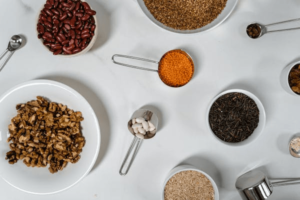
Introduction
Are you a diabetic looking to take control of your health and work towards remission? One powerful tool in your arsenal is adopting a plant-based diet. Not only can this dietary shift help you manage your blood sugar levels, but it can also pave the way to a healthier, more vibrant life. In this blog, we’ll explore some valuable pointers to guide you on your journey to a plant-based diet, especially if you’re new to this way of eating.
- Educate Yourself and Keep Learning
The first step on your path to a plant-based diet is education. Understand the basics of plant-based nutrition, including which foods are diabetes-friendly. Learn about portion control and how to balance your macronutrients. Stay informed about the latest research, recipes, and plant-based cooking techniques. The more you learn and experiment with new foods, the easier and more enjoyable your plant-based journey will become.
- Consult with a Healthcare Professional
Before making any significant dietary changes, it’s crucial to consult with a healthcare professional, preferably a registered dietitian or nutritionist with experience in diabetes management. They can provide personalized guidance, help you set realistic goals, and monitor your progress.

- Gradual Transition
Switching to a plant-based diet doesn’t have to happen overnight. Take a gradual approach to make the transition smoother and more sustainable. Start by increasing the amounts of plant-based proteins and reducing the animal-based ones. Then incorporate one plant-based meal into your daily routine and gradually increase the number of plant-based meals as you become more comfortable with the lifestyle.
- Explore Plant-Based Protein Sources
Protein is an essential component of your diet, especially when managing diabetes. Despite common perceptions, plant-based meals can provide adequate, good quality, economical and a wide variety of proteins and their sources. They can safely replace animal-based ones, such as meats, dairy, and eggs. Explore various plant-based protein sources such as tofu, tempeh, legumes (beans, lentils, and chickpeas), nuts, and seeds. Vegetables, such as cabbage, carrots, and callaloo are not generally good sources of protein.
Most plant-based proteins don’t provide all the essential amino acids (complete proteins). Some plant-based sources of complete proteins include soy (including tempeh, tofu and soy milk), quinoa, chia seeds, hemp seed and buckwheat. Having different plant-based proteins during a given day, such as legumes and nuts/seeds or legumes and whole grains, will ensure that you get all the essential amino acids.
- Experiment with Herbs and Spices:
Many believe that a plant-based diet won’t satisfy your taste buds, but herbs and spices can add incredible flavor to your plant-based dishes without relying on excessive salt or sugar. Experiment with herbs like basil, cilantro, and rosemary, as well as spices like cinnamon, turmeric, and cumin to make your meals more exciting.

- Include Healthy Fats:
While reducing saturated fats is important for diabetes management, don’t forget about healthy fats like avocados, nuts, and olive oil. These fats can provide satiety and essential nutrients while supporting heart health. Persons with higher metabolism may require adjusting the amount of healthy plant-based fats upwards to replace the fat formerly obtained from animal-based proteins.
- Meal Planning and Preparation
Plan your meals ahead of time and prepare plant-based options that are both delicious and satisfying. Having a well-thought-out meal plan will prevent you from reaching for unhealthy, convenient options when you’re hungry and short on time.
- Consider Supplements:
Depending on your specific dietary choices and individual needs, you may want to consult with your healthcare provider about potential nutrient supplements, such as vitamin B12 or omega-3 fatty acids, to ensure you meet all your nutritional requirements.
- Plan for Social Situations:
When dining out or attending social gatherings, check the menus for plant-based options or bring a plant-based dish to share. Communicate your dietary preferences with friends and family to ensure a supportive environment.

- Reevaluate and Adjust:
Periodically assess your progress and make adjustments as needed. Your dietary needs may change over time, so staying flexible and willing to adapt is essential for long-term success. For example, the later stages of pregnancy may require higher amounts of protein.
- Celebrate Small Wins:
Celebrate your successes along the way, whether it’s achieving better blood sugar control, trying a new plant-based recipe, or reaching a personal dietary milestone. Positive reinforcement can keep you motivated.
- Don’t Be Too Hard on Yourself:
Remember that transitioning to a plant-based diet is a journey, and it’s okay to have occasional slip-ups or moments of indulgence. Be patient and forgiving of yourself as you adapt to this new way of eating.
- Seek Support and Community
Transitioning to a plant-based diet can be easier when you have the support of like-minded individuals. Join online forums, social media groups, or local support groups to connect with others who share your journey. They can provide encouragement, share recipes, and offer valuable tips.
Conclusion
Switching to a plant-based diet as a diabetic working towards remission is a powerful and positive life-changing decision. By educating yourself, consulting with healthcare professionals, and taking a gradual and mindful approach, you can make this transition successfully. Remember to monitor your progress, embrace plant-based protein sources, and focus on fiber-rich foods to keep your blood sugar levels in check. Behaviour change is important to make this. Some other strategies for this will be discussed in the next blog. With dedication and support, you can achieve better health and work towards diabetes remission through the power of a plant-based diet.

